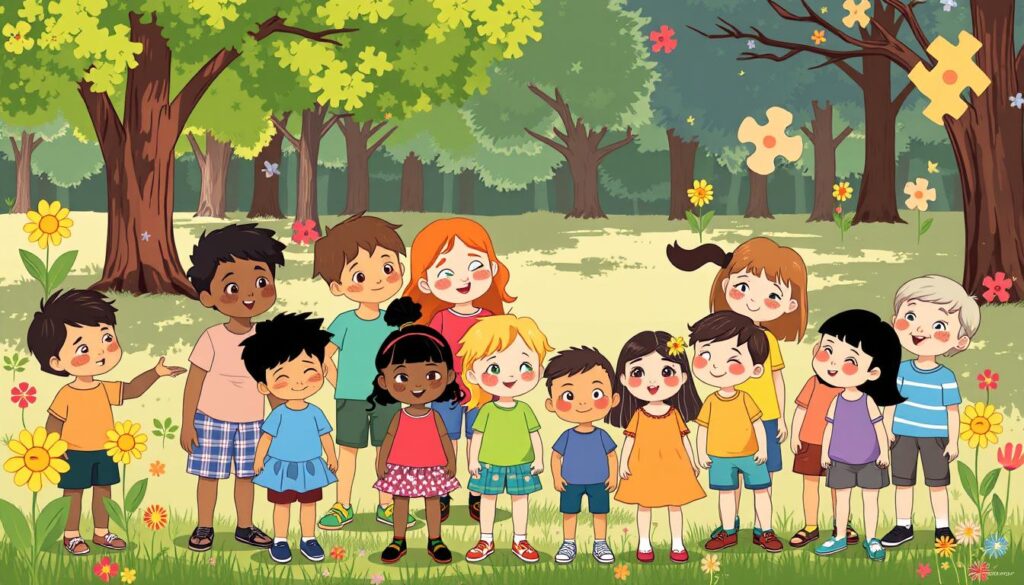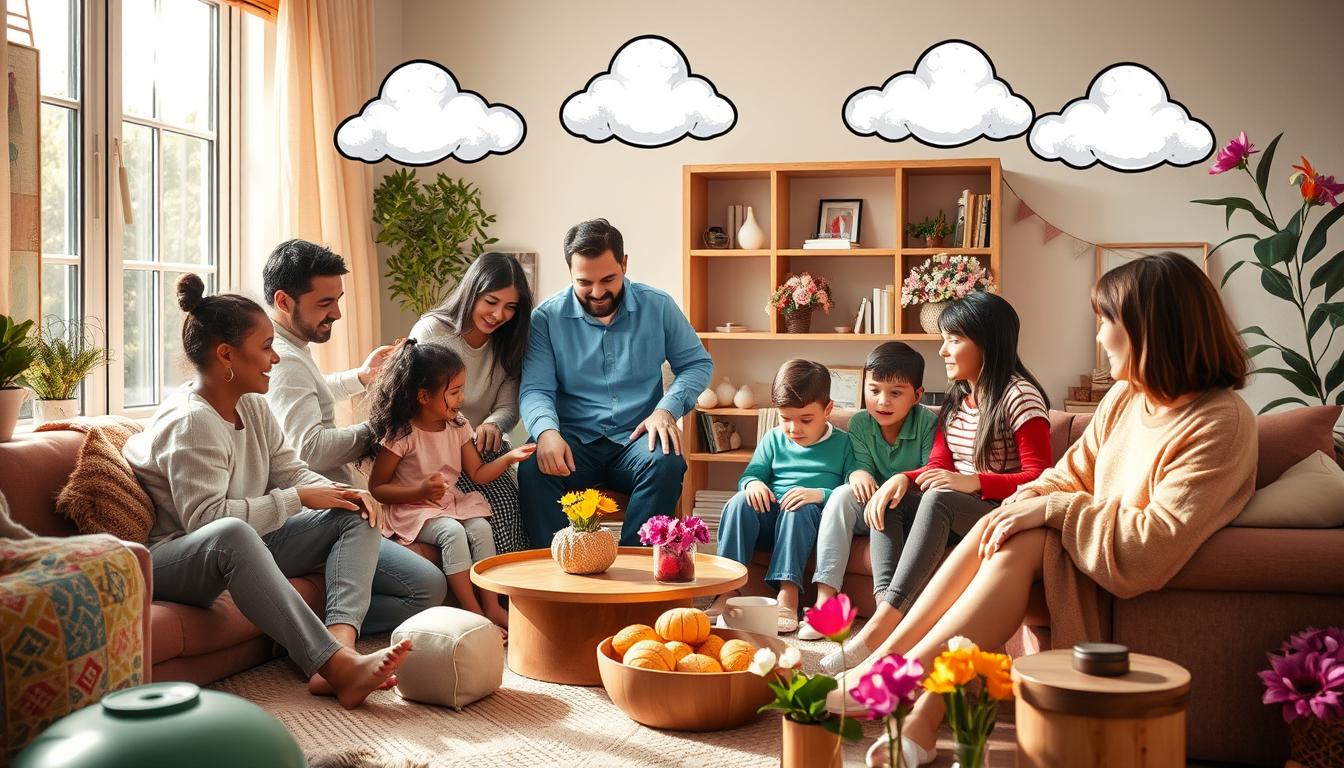Your family is very important for your child’s mental health and well-being. From the start, your home’s atmosphere greatly affects their feelings, social skills, and mind. It’s key to understand how family impacts a child’s mental health to help them grow well.
Your family gives your child love, safety, and guidance. How you talk, solve problems, and show support can help or hurt their mental health. Knowing how family affects mental health helps you make a supportive home for your child.
Key Takeaways
- Your family profoundly shapes your child’s mental health and overall well-being.
- The dynamics within your household, such as communication patterns and conflict resolution, significantly impact your child’s emotional and psychological development.
- Understanding the role of family structure, attachment bonds, and parenting styles is crucial in fostering a supportive environment for your child’s mental health.
- Recognizing the signs of childhood mental health challenges and addressing them with appropriate support can make a significant difference in your child’s well-being.
- Creating a nurturing and emotionally secure family environment is key to promoting your child’s healthy psychological development.
Understanding the Role of Family in Children’s Mental Health
Family dynamics are key in shaping a child’s mental health and well-being. The structure and relationships within a family deeply affect a child’s emotional and psychological growth. It’s vital to grasp the role family plays in a child’s mental health journey.
Defining Mental Health in Early Development
Mental health in early childhood involves developing emotional, social, and cognitive skills. It’s about forming strong bonds, managing emotions, and understanding the world. A child’s mental health is shaped by their environment and family relationships, not just genetics.
Core Family Influences on Psychological Well-being
The family is the main source of care, support, and guidance for a child. The quality of parent-child relationships and family communication greatly affect a child’s mental health. Positive family dynamics can build resilience, self-esteem, and a sense of belonging. On the other hand, dysfunctional environments can lead to mental health issues.
The Impact of Family Structure on Mental Health
- Traditional two-parent households
- Single-parent families
- Blended families
- Foster care and adoptive families
Different family structures can significantly impact a child’s mental health. Each family faces unique challenges and opportunities that shape a child’s emotional and psychological development. It’s important to understand these impacts to support children’s mental health.
The Power of Parent-Child Attachment Bonds
As a parent, the bond you share with your child is key to their mental health. This emotional connection, called parent-child attachment, shapes their ability to form good relationships and handle emotions. It also helps them grow strong and resilient.
A strong attachment means trust, being responsive, and feeling safe. This lets children explore the world with confidence. They know they can always come back to a supportive place. This bond supports their emotional and social growth.
- Children with strong parent-child relationships tend to have higher self-esteem and better problem-solving skills. They also make meaningful connections with others.
- On the other hand, problems in the attachment bond, like neglect or inconsistent care, can harm their mental health. It can lead to attachment disorders and trouble managing emotions.
By focusing on emotional support and nurturing your parent-child relationship, you help your child grow. They’ll develop resilience, empathy, and social skills. This is a powerful gift for their future.
“The greatest gift you can give your child is a secure attachment bond. This foundational relationship sets the stage for their future well-being and relationships.”

Family Dynamics and Emotional Development
Healthy family dynamics are key to a child’s emotional growth. How families talk, solve problems, and build trust affects a child’s mental health. Parents and caregivers can help by creating a supportive environment.
Communication Patterns Within Families
Good communication is vital for strong family ties. Families that talk openly, listen well, and respect each other’s feelings feel secure and trusted. But, families that criticize too much or ignore each other can hurt a child’s feelings and relationships.
Conflict Resolution and its Effects
Dealing with disagreements is part of family life. Families that solve problems with empathy and compromise help their children manage feelings and solve problems better. But, families that fight too much or are violent can make children feel unsafe and upset.
Building Trust and Security
Trust and safety are key in families. Families that support each other, show love, and are stable help their children feel good about themselves and handle emotions well. This trust helps children face emotional challenges.
Understanding family dynamics helps parents and caregivers create a supportive environment. This support is crucial for a child’s emotional health and future relationships.

| Positive Family Dynamics | Negative Family Dynamics |
|---|---|
|
|
“A child’s emotional development is deeply rooted in the dynamics of their family environment. By prioritizing healthy communication, conflict resolution, and trust-building, parents can lay the foundation for their child’s lifelong emotional well-being.”
Recognizing Signs of Childhood Mental Health Challenges
As parents, it’s vital to watch over our children’s emotional health. Childhood is full of joy, but young minds can still face mental health issues. By spotting early signs, we can offer emotional support and find help when it’s needed.
Some common signs of childhood disorders include:
- Persistent mood changes, like lasting sadness, irritability, or anxiety.
- Big changes in behavior, like pulling back, being aggressive, or having trouble focusing.
- Unusual changes in sleep, appetite, or energy.
- Physical symptoms without a clear cause, like headaches or stomachaches.
- Trouble making and keeping friends.
Remember, every child is different, and mental health issues show up in various ways. Trust your instincts and watch for any changes in your child’s mood, behavior, or health.
“The first step to supporting a child’s mental health is to create an environment where they feel safe, understood, and empowered to express their feelings.”
If you see any worrying signs, get help from a mental health expert right away. Early action and the right support can help manage many childhood mental health issues. This way, your child can grow strong and resilient.

How Different Parenting Styles Impact Mental Well-being
As parents, our parenting style greatly affects our children’s mental health. It’s important to know how different styles impact them. This knowledge helps us create a supportive and caring environment for our kids.
Authoritative vs. Authoritarian Approaches
Authoritative parents balance high expectations with warmth and responsiveness. This approach is linked to better self-esteem, social skills, and school performance in kids. On the other hand, authoritarian parents use strict rules and harsh discipline. This can cause anxiety, depression, and behavioral problems in children.
Permissive and Neglectful Parenting Effects
Permissive parents are very hands-off, offering little guidance. This can make it hard for kids to control themselves and feel responsible. Neglectful parents, who ignore their children’s needs, can cause the most severe mental health issues.
Finding the Right Balance
To help children thrive, we need to find a balance. We should set clear rules, have high expectations, and be supportive. This approach helps kids develop self-discipline, emotional intelligence, and resilience. By understanding parenting styles, we can make choices that support our children’s mental health and future success.
“Effective parenting is not about perfection, but about being present, responsive, and guiding our children with care and understanding.”
Sibling Relationships and Psychological Development
Sibling relationships are key in shaping a child’s mental health and growth. The bond between brothers and sisters greatly affects how they handle emotions, social skills, and self-worth.
When siblings get along well, it builds empathy, conflict-solving skills, and a strong family bond. But, constant fighting or lack of guidance can lead to resentment, anxiety, and depression.
It’s important for parents to understand how sibling relationships affect a child’s mental health. By creating a supportive environment, families can help their children grow and become resilient.
Navigating Sibling Dynamics
Good communication, conflict resolution, and respect are essential for positive sibling relationships. Parents can guide their children by showing these behaviors and helping them deal with family dynamics.
- Encourage open and honest dialogue between siblings to address tensions and find constructive solutions.
- Teach children strategies for managing emotions and resolving conflicts without resorting to aggression or hurtful behavior.
- Promote a sense of shared identity and belonging, celebrating each child’s unique strengths and contributions to the family.
| Positive Sibling Interactions | Negative Sibling Interactions |
|---|---|
|
|
By promoting positive sibling relationships and tackling challenges, parents can create a supportive family environment. This helps in the healthy psychological development of their children.
“Siblings are the people we practice on, the people who teach us about fairness and cooperation and kindness and caring – quite often the hard way.” – Pamela Dugdale
The Impact of Family Trauma and Stress
Childhood is a critical time, shaped by the family. Trauma or stress in families can deeply affect a child’s mental health. It’s important to understand stress sources and find ways to cope.
Identifying Sources of Family Stress
Stress in families can come from many places. This includes childhood trauma, domestic violence, money problems, substance abuse, or losing a loved one. These issues can make a child feel anxious, scared, and unsure. This can harm their emotional growth and sense of safety.
Coping Mechanisms and Support Systems
- Getting help from emotional support professionals can be very helpful. This includes counseling or therapy.
- Learning to communicate well and solve conflicts can make family bonds stronger. It gives a sense of stability.
- Doing self-care, like mindfulness or exercise, can help manage stress. It builds resilience in family members.
Breaking Negative Cycles
It’s possible to overcome the effects of family trauma and stress. By tackling the stress causes, using good coping strategies, and building support, families can create a safe and caring environment. This helps children grow strong and confident.
“Healing doesn’t mean the damage never existed. It means the damage no longer controls our lives.”
Creating a Supportive Family Environment
Creating a nurturing family environment is key for kids’ mental health. By offering emotional support, using effective parenting, and getting family therapy when needed, you can help your kids thrive. This makes a safe space for them to grow.
Emotional support is the base of a healthy family. Spend quality time talking openly and listening well to your kids. Let them share their feelings and show empathy. These actions help build emotional strength and resilience in your children.
Parenting styles greatly affect kids’ mental health. Aim for an authoritative style, which is firm yet caring. This approach helps kids develop self-control, self-worth, and a sense of safety. If you’re facing parenting challenges, family therapy can help find the right balance.



